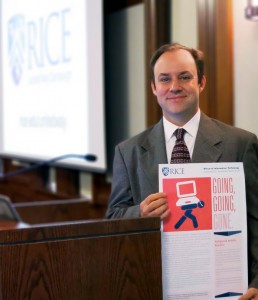 The juncture of a calendar year end with the midpoint of an academic year provides an ideal opportunity to review and preview IT projects developed at the request of our customers, or in collaboration with our colleagues. Originally written as a high-level IT overview for Rice’s executive leadership team, the Annual Report of the Vice Provost for Information Technology is now publicly available online. Some of the report highlights include:
The juncture of a calendar year end with the midpoint of an academic year provides an ideal opportunity to review and preview IT projects developed at the request of our customers, or in collaboration with our colleagues. Originally written as a high-level IT overview for Rice’s executive leadership team, the Annual Report of the Vice Provost for Information Technology is now publicly available online. Some of the report highlights include:
Multi-media, High & Low Tech Tools for Teaching and Learning
From media assets like digital film clips and audio files to class participation from a mobile device to storytelling as a course project, Rice faculty and students continue using both high and low technologies in active learning environments. However, Rice instructors also engage their students in active learning with little or no technology. The teaching and learning stories in this report illustrate how IT’s Academic Technology Services staff members help Rice instructors find solutions for learning activities that have become time-consuming and detract from the actual learning goals of the course. Read more on pages 4-5.
BlueGene P & Q, Power8, and BiRD Cloud Support for Researchers
IT supports research computing clusters like the BlueGene P & Q clusters, the IBM Power8, and BiRD Cloud, where Rice researchers and their external colleagues are working on a variety of problems related to energy, geophysics, life sciences, and cancer research, how to extrapolate solutions for medical research and clinical practices from big data and analytics technologies, as well as how to best use hybrid cloud environments to enhance code development and interactive data analysis with tools like Matlab, R, and Hadoop. Read more on pages 6-7.
Training Opportunities for Instructors and Researchers
From helping postdocs with their high performance computing (HPC) code to introducing new instructors to the tools on their classroom podium computers and the many features of OWL-Space, IT staff members provide multiple workshops for Rice community members. Read more on pages 8-9.
Campus-wide Initiatives Improve Network, Systems, and Security
How Rice faculty, staff and students access the university’s vast array of digital resources depends on a highly available and efficient infrastructure composed of a quick network with a hearty bandwidth and robust systems that can manage torrential surges of traffic and data on an hourly basis. This infrastructure must also be able to identify, withstand, and rebuff cyber attacks designed to usurp university resources and data and slow down competitive research. The 2014 report does an especially good job of explaining the infrastructure and security improvements currently underway across the campus. Read more on pages 10-12.
Collaboration Results that Solve Administrative Process Challenges
From improvements to blogging tools used by faculty, staff and students to radios used by RUPD, IT has continues to partner with colleagues across the university to help solve administrative process or equipment challenges that prevent Rice community members from achieving their daily tasks in an effective way. Several of these interdepartmental collaborations are featured in this report, including an interim solution for the faculty hiring process and a system that helped a committee use big data analytics in a presentation on corporate partnership trends for the Board of Trustees. Read more on pages 13-15.
Kamran Khan
Vice Provost for Information Technology,
Rice University










